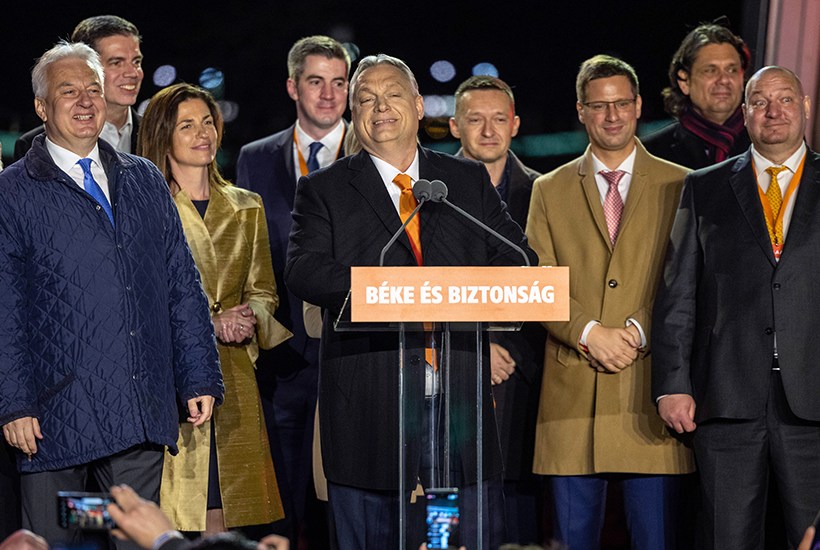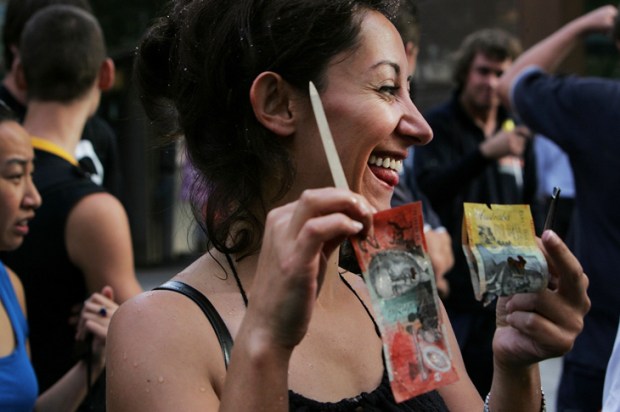For a small ex-Soviet satellite, Hungary has punched above its weight in attracting international attention in recent times. So much so that the defeat in the 3 April elections of its conservative prime minister for 16 years, Viktor Orbán, would have been celebrated loudly in woke European and broader Guardianista circles, for a while swamping the news from Ukraine. Happily this was not to be.
Especially since Donald Trump faded from view, Orbán has been the favourite hate-figure for Europe’s left-liberal establishment. His original sin was to denounce Angela Merkel’s decision to invite over a million Third World (mostly non-refugee) migrants into the EU in 2015 and her pressure to share the arrivals around the 28 member-states. Orbán, an admirer of Australia’s robust border security, responded by building a security fence on Hungary’s southern border, a measure the EU supported in other cases (Greece-Turkey, Spain-Morocco), but condemned in this instance – because it was a poke in the eye to Saint Angela. The EU was about building bridges not walls, the Brussels bien pensants piously intoned.
Orbán compounded the Euro-sin of being pro-strong borders by saying he had no interest in repeating western Europe’s experience of mass Third World immigration. He said, ‘Hungary has the right—and every nation has the right—to say that it does not want its country to change.’ France, Britain and Germany were entitled to admit millions of Third World immigrants. But ‘we have a duty to look at where this has taken them.’ The EU thought its worst news ever was Brexit until Orbán made it clear he wanted to stay in – on a mission to stop it from becoming a superstate with the member-states reduced to provinces.
At an earlier stage of the Western demonisation of Orbán, the charges were that he was an autocrat and an antisemite. Some even claimed he was a dictator. Such allegations were always absurd. Hungary is a thriving multi-party democracy, highlighted by the fact that the anti-Orbán opposition won Budapest in the 2019 local elections and again in the 3 April elections.
Opposition posters have been everywhere, the non-state media is politically diverse and anti-government demonstrations are a regular part of life.
On antisemitism, Orbán has been a vocal critic of American financier, philanthopist and open borders activist George Soros. But to claim, as Orbán’s critics do, that anti-semitism lurks in the criticism has no more substance than suggestions that it’s racist to describe Kamala Harris as an embarrassment. Orbán passed a Holocaust denial law, made Holocaust education compulsory and financed an Oscar-winning film about Auschwitz. There is no stronger European supporter of Israel, and Hungary’s large Jewish community is much safer from physical violence than further west in Europe.
Orbán’s critics have more recently shifted focus to his offences against wokery. He angered Europe’s left-liberal establishment by describing himself as a supporter of ‘illiberal democracy’, meaning ‘conservative’ or ‘Christian’ democracy. Hungary’s laws on his watch have become unapologetically based on traditional family values; there are two genders; gender cannot be legally changed; gay couples, while enjoying all other rights, cannot marry or adopt children; and exposing children to LGBTIQ issues outside the family is banned. The EU – evolving ever more into a champion of fashionable orthodoxies – plans to make these laws illegal, threatening to withold budgetary allocations until they’re repealed.
Undaunted by the EU’s woke jihad, Orbán has initiated the Western world’s most energetic effort to reverse demographic decline. This focuses on generous incentives to parents to have more children, including tax breaks, grants and soft loans for housing and support for families buying cars. A woman who gives birth to four or more children never has to pay income tax again. The minister who oversaw the introduction of these policies, Katalin Novák, was recently elected as Hungary’s first female president.
Orbán’s secure borders and family support policies have broad appeal in Hungary, and his record of economic management has been impressive: steady economic growth is now returning after the Covid hiccup (4.8 per cent forecast in 2022) and unemployment is down to 3.8 per cent (4.5 per cent a year ago).
The opposition coalition which challenged Orbán was a typically Euro left to right ragbag which agreed on little except hatred of him. Their key message was going to be the potentially scary one for Hungarians that sticking with Vic would risk the country’s widely-supported EU membership. But the campaign never materialised. The opposition’s candidate for prime minister, Péter Márki-Zay, who seemed like a good choice because he’s a Catholic family man and was a member of Orbán’s party, Fidesz, was gaffe-prone and failed to win a seat.
Orbán deserved re-election but his government hasn’t been entirely admirable. In relation to both China and Russia it’s taken a hyper-realist approach, prioritising economic interests while resisting, more than most other Western countries, condemning human rights abuses. Like many European countries, Hungary is energy-dependent on Russia: 85 per cent of its gas and 60 per cent of its oil is from Putin’s regime, while the country’s one nuclear power plant, Paks, which accounts for half of Hungary’s electricity, is also financed and fuelled by Russia. Any half-competent opposition would have focused relentlessly on how the government got the country into this mess.
But Orbán is not a Putin ‘ally’, as is often claimed. He condemned Russia’s invasion, has joined EU sanctions and has welcomed more than half a million Ukrainian refugees. Still, strains have emerged with Hungary’s previous Visegrád 4 allies Poland and the Czech Republic as Hungary rejects, unlike them, sending lethal military aid to Ukraine. The ever-wily Orbán in fact turned the issue to his advantage, accusing the opposition, which said it would help Ukraine with lethal aid, of risking war, whereas if they voted for him, they’d be choosing peace. Hungarians seemed receptive to the message.
Orbán’s less than robust approach to the world’s two worst thugs has disappointed some Western conservatives, who otherwise admire him. Still, they should raise a glass of tokay to his big win. Or maybe even celebrate by visiting Hungary and enjoying its great charms, recently further enhanced by becoming one of Europe’s few countries to drop all Covid entry restrictions and mask rules.
Got something to add? Join the discussion and comment below.
Get 10 issues for just $10
Subscribe to The Spectator Australia today for the next 10 magazine issues, plus full online access, for just $10.
Mark Higgie: Twitter @markhiggie1
You might disagree with half of it, but you’ll enjoy reading all of it. Try your first month for free, then just $2 a week for the remainder of your first year.














Comments
Don't miss out
Join the conversation with other Spectator Australia readers. Subscribe to leave a comment.
SUBSCRIBEAlready a subscriber? Log in